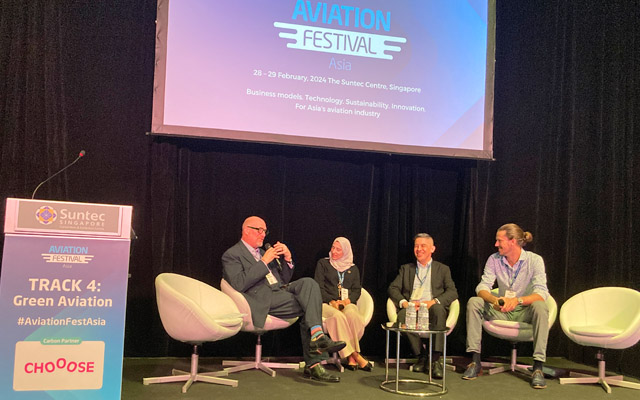The roadmap to net zero carbon emissions can be achieved through aircraft technology development; operations and infrastructure improvements; market-based measures and offsets; and the use of sustainable aviation fuel (SAF), opined Cebu Pacific chief strategy officer, corporate strategy office, Alex Reyes during the recent Aviation Festival Asia (AFA) held in Singapore.
Referring to them as the four levers in an implementable strategy, Reyes commented that “climate action is imperative as extreme weather is a top risk that presents a material crisis on a global scale as well as for the aviation sector”.

Averting climate overshoot beyond the 1.5°C threshold requires net zero carbon emissions by 2050, and while the industry has integrated all the four levers into its strategy and operations, there is much to be done.
Speaking at the green aviation track of the AFA, Reyes said fleet modernisation with new engine option transition is already taking place at Cebu Pacific, where 43 per cent of its fleet is the Airbus A320neo and the goal is to fly an all-new neo fleet by 2028.
Separately, the airline is studying the use of e-aircraft and propulsion battery technology on short-range domestic sectors of an hour or so, to make up around 10 to 20 per cent of its network.
Cebu Pacific is collaborating with original equipment manufacturers and leading innovators on low-carbon and/or zero-emission technologies and the roadmap also requires fuel efficiency best practices, fight plan optimisation and electrification of ground transport and common support equipment, he added.
Other initiatives include carbon removal through nature, and capacity building for Carbon Offsetting and Reduction Scheme for International Aviation – stakeholder engagement is also being stepped up.
As for SAF, the supply network has to be expanded so that its use can be integrated into operations and government policies for its adoption must be adopted.
While younger consumers are willing to pay for green initiatives, Reyes noted a mindset change was needed among older passengers.
He said Singapore mandating SAF use for departing flights from 2026 – and travellers having to pay more for air tickets to support the use of greener jet fuel – is a step in the right direction.
Following the presentation at the panel discussion, Rahimah Ali, group head of sustainability, Malaysia Airlines (MAS), opined that SAF use, now only at 0.1 per cent, can become a crucial lever in the medium- and long-term with innovation and technology.
She said MAS and Petronas, Malaysia’s global energy company, need to be the “first movers” in the country when it comes to SAF.
While airlines are committed, not everyone is ready, opined Philipp Bonkatz, general manager, Singapore, Malaysia and Brunei, Lufthansa Group.
He said the industry is fragmented, but more and more are driving towards the goals of SAF use reaching 60 per cent by 2050 and a 2030 timeline for certification.
Bonkatz commented: “There is hardly international regulation in the region… and while 30 per cent of airlines are prepared to spend more, only a smaller number are doing something.”
He agreed there must be commitment from all stakeholders – consumers, government and the industry, a sentiment echoed at other AFA sessions.
Moderator Torbjorn Karlsson, senior client partner, Korn Ferry, pointed out airlines need to make it easier for passengers to be able to opt in to pay for carbon offsetting, while Rahimah noted that MAS was seeing sustainability support from passengers in western markets like Australia, the UK and the US.
Bio fuels already exist, Bonkatz observed, and shared that Swiss students are testing solar fuel and other types of e-fuel.
He is confident that there are resources to bankroll start-ups to come up with solutions but they have to be “safe” and “affordable”, and that is why it is taking so long for them to be “certifiable”.
The panellists said the awareness of and “call to arms” on SAF and other green technologies inside and outside the industry can be considered an achievement so far.




















